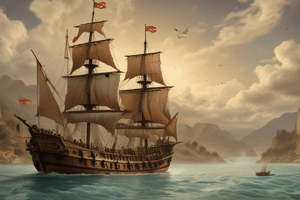Podcast
Questions and Answers
What is the primary goal of examining connections in world history?
What is the primary goal of examining connections in world history?
- To understand the development of feudalism in the Middle Ages
- To analyze the impact of global exploration on the world's economic landscape
- To better understand how ideas, goods, and people have traveled across the globe (correct)
- To explore the role of individual dynasties in shaping world history
Which subcategory of world history focuses on the civilizations and cultures that emerged in the ancient world?
Which subcategory of world history focuses on the civilizations and cultures that emerged in the ancient world?
- Global Exploration
- Wars and Battles
- Historic Dynasties and Families
- Ancient World (correct)
What is the overarching goal of world history as a field of study?
What is the overarching goal of world history as a field of study?
- To explore the role of the Church in the Middle Ages
- To understand the origins of feudalism
- To analyze the impact of global exploration on the world's economic landscape
- To understand the interconnectedness of human societies and cultures throughout history (correct)
What is the name of the period that covers the time from the fall of the Western Roman Empire to the Renaissance?
What is the name of the period that covers the time from the fall of the Western Roman Empire to the Renaissance?
What is the focus of the Wars and Battles subcategory of world history?
What is the focus of the Wars and Battles subcategory of world history?
What is the primary focus of world history?
What is the primary focus of world history?
Which of the following themes is characterized by the study of specific events and details in understanding broader trends?
Which of the following themes is characterized by the study of specific events and details in understanding broader trends?
What is the significance of studying the Silk Road in world history?
What is the significance of studying the Silk Road in world history?
What is the primary benefit of the interdisciplinary approach in world history?
What is the primary benefit of the interdisciplinary approach in world history?
What is the primary goal of world history in understanding the past?
What is the primary goal of world history in understanding the past?
Flashcards are hidden until you start studying
Study Notes
What is World History?
World history is the study of the past, focusing on large-scale events and processes that have affected various regions and civilizations around the world. It covers a vast expanse of time, from the emergence of early human societies to the present day, and encompasses a diverse range of themes, including politics, economics, cultural exchanges, and technological developments.
Themes and Details
World history is characterized by its interdisciplinary approach, which allows scholars to examine historical events from multiple perspectives. Themes such as scale, details, and connections help to create a comprehensive understanding of the world's past.
-
Scale: World history emphasizes large-scale events and processes that have had a significant impact on human societies, often over extended periods of time. These events can include the rise and fall of empires, the spread of religions, and the development of global trade networks.
-
Details: While world history focuses on large-scale patterns and processes, it also emphasizes the importance of specific events and details in understanding these broader trends. For example, studying the Silk Road can reveal connections between various cultures and societies, as well as the influence of trade on economic and cultural development.
-
Connections: World history highlights the interconnectedness of different societies and cultures throughout history. By examining these connections, historians can better understand how ideas, goods, and people have traveled across the globe, shaping the world we know today.
World History Subcategories
World history encompasses a wide range of subcategories, each focusing on specific aspects of human history. Some of these subcategories include:
Ancient World
This subcategory explores the civilizations and cultures that emerged in the ancient world, such as the Roman Empire and the Greek city-states.
Middle Ages
The Middle Ages, also known as the Medieval Period, covers the period from the fall of the Western Roman Empire to the Renaissance. This era saw the development of feudalism, the rise of the Church, and the emergence of new artistic and architectural styles.
Global Exploration
This subcategory examines the era of global exploration, which began in the late Middle Ages and continued through the modern age. It includes the voyages of European explorers like Christopher Columbus and the impact of these explorations on the world's political and economic landscape.
Wars and Battles
This subcategory focuses on the wars and battles that have shaped human history, from ancient conflicts like the Battle of Thermopylae to modern wars such as World War II.
Historic Dynasties and Families
This subcategory explores the role of individual dynasties and families in shaping world history, from the Maccabees in Jewish history to the Ming dynasty in Chinese history.
Conclusion
World history is a vast and complex field that seeks to understand the interconnectedness of human societies and cultures throughout history. By examining large-scale patterns and specific events, world historians can provide valuable insights into the human experience and help us better understand the world we live in today.
Studying That Suits You
Use AI to generate personalized quizzes and flashcards to suit your learning preferences.




